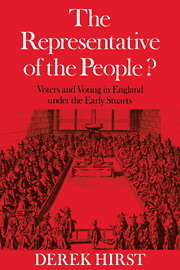Book contents
3 - The borough franchise disputes
Published online by Cambridge University Press: 15 December 2009
Summary
The pressures in the towns
The county franchise was becoming broader through the efforts of man only insofar as he fuelled the inflationary process. That was not the case in the boroughs. Here, more people were involved as a result of certain actions, the decisions to open the limited franchises in dozens of communities to freemen, inhabitants at large, or whatever group was in question. The process was normally one of local pressure from an insurgent group producing a disputed return of members to parliament, and the House of Commons then deciding in favour of the popular challengers. It is tempting to think in terms of a meaner sort that had been politically aroused by the growing educational provision and by the religious and political debate of the time and which was now entering the fray to the best of its abilities; or even demanding the vote because it realised its value. But while the clashes with reactionary and entrenched oligarchy may have occurred in the heated atmosphere of national polarisation, the genesis of the disputes must be sought over a longer period of time. This might, in any case, be suggested by the outbreak of many conflicts in the early 1620s, before the national divisions were at all clear.
The most common pattern in franchise disputes was one of the particularist grievances of an under-privileged group against oligarchy gradually building up and being capitalised on by the self-interested intervention of an outside gentleman who was looking for support in his bid for a seat. It is clear that the meaner sort was becoming active: but its pressure was not always sufficient of itself to enable it to achieve its goals.
- Type
- Chapter
- Information
- The Representative of the People?Voters and Voting in England under the Early Stuarts, pp. 44 - 64Publisher: Cambridge University PressPrint publication year: 1975
- 1
- Cited by



